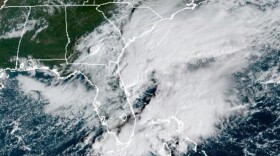While Hurricane Ian cut a path of destruction across the Caribbean and Florida before weakening, it did not do nearly as much damage to North Carolina.
Ian brought heavy rain and wind to North Carolina over the course of a few days, but Vice President of Operations and Logistics for the American Red Cross Brad Kieserman said the storm destroyed or caused major damage to less than 50 homes in the state.
“We had a couple of shelters open,” said Kieserman, “but they were all closed within 24 hours after the storm passed because there was no ongoing need.”
Still, the Red Cross plans to continue working with residents who may need help.
“We’ll be doing it for the next week or so, providing financial assistance and also meeting other mass care needs including psychological first aid and healthcare services,” said Kieserman.
According to Governor Roy Cooper’s office, five deaths were reported in North Carolina from Ian. Four of those deaths occurred when drivers lost control of their vehicles during the storm and one was caused by carbon monoxide poisoning from a generator running indoors during a power outage.
More than 70,000 Duke Energy customers — the state's largest utility — were without power by Friday afternoon as Hurricane Ian approached North Carolina. More than 95% of customers saw power restored by the end of the weekend, the power company said.
As North Carolina continues with its remaining recovery steps, the state is turning to support Florida.
“Although we mourn five deaths and incurred some damage, it’s clear North Carolina missed the worst of this storm,” said Cooper in a Wednesday press release. "Now that some of our emergency resources are no longer needed at home, we are sending additional assistance to our Florida neighbors, who have a long road of recovery ahead.”
The governor’s office says the state will provide 16 personnel on two incident management teams for two weeks to help Lee County, Florida coordinate its response and recovery operations.
Lee County is home to Fort Myers and Cape Coral, some of the locations hardest hit by Hurricane Ian.
The 2022 hurricane season is likely to be the seventh consecutive above-average hurricane season, the National Oceanic and Atmospheric Administration reported in August, and Ian is the 2nd major hurricane so far this year.
WUNC’s Laura Pellicer contributed to this report







